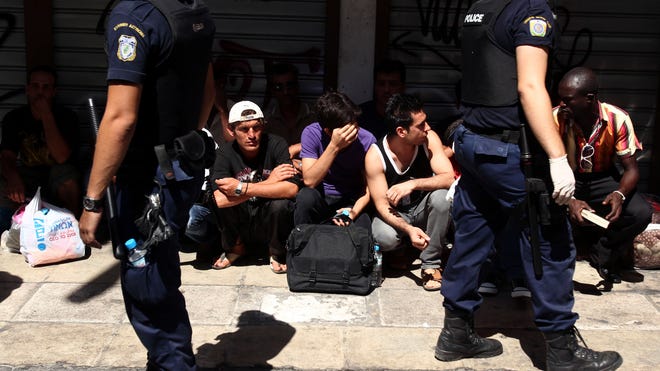 |
| Image via Der Tagespiegel |
The protest, which followed last month's march throughout Germany, aimed in general to call attention to the plight of refugees in Germany but it also had several key specific demands (a full list can be found here.) Namely, to stop deportations, close refugee "camps" (holding facilities for asylum seekers, often in the middle of nowhere), recieve working permits and permission to learn German, and above all, to abolish the Residenzpflicht.
Residenzpflicht is a long standing policy applying to asylum seekers that limits their freedom of movement while their asylum applications are being processed. They may not leave the administrative zone where they have first registered in Germany without a permit until their asylum status has been sorted out- which in extreme cases can take up to 10 years. Naturally, this policy keeps refugees in a sort of limbo, preventing them from fully integrating into society, traveling to visit relatives, studying at university, or finding work. This nasty law also means the state controls whether you can attend meetings or protests- limiting freedom of speech and the right to assemble.
With the recent refugee march from Wurzburg to Berlin, the refugees and their allies practiced non-violent resistence to these and similar policies, and sought to make the invisible visible.
Did it work? Der Tagespiegel reports today that the Berlin Senator for Integration Dilek Kolat and Refugee Commissioner Maria Böhmer visited the strikers and had a 4 hour discussion with them about their demands. Although the resulting quotes are basically platitudes, the politicians expressed their support of the protest and stated that they supported the desires of the protestors to learn German and start working. Böhmer apparently questioned whether the Residenzpflicht is still "up-to-date," and hinted that they would write a letter discouraging the arrest of the protestors for violating their residence restrictions by travelling to Berlin.
We'll have to keep an eye on the situation to see whether any changes are made to refugee housing, work permits, or the draconian Residenzpflicht. In the meantime, I think the protestors can cautiously celebrate a success.
Read More:
Refugees End Their Hungerstrike (Der Tagespiegel, in German)
Refugee Tent Action (The website of the Hunger Strikers)
AsylstrikeBerlin (Website with information about the refugee march and protest)
Karawane (Organization for the Rights of Refugees and Migrants)
Pro-Asyl (NGO supporting Refugees in Germany)
And finally, here's a clip from an awesome recent documentary by Denise Garcia Bergt about Germany's refugees and migrants, called "Residenzpflict."
Trailer Residenzpflicht from denisebergt on Vimeo.






